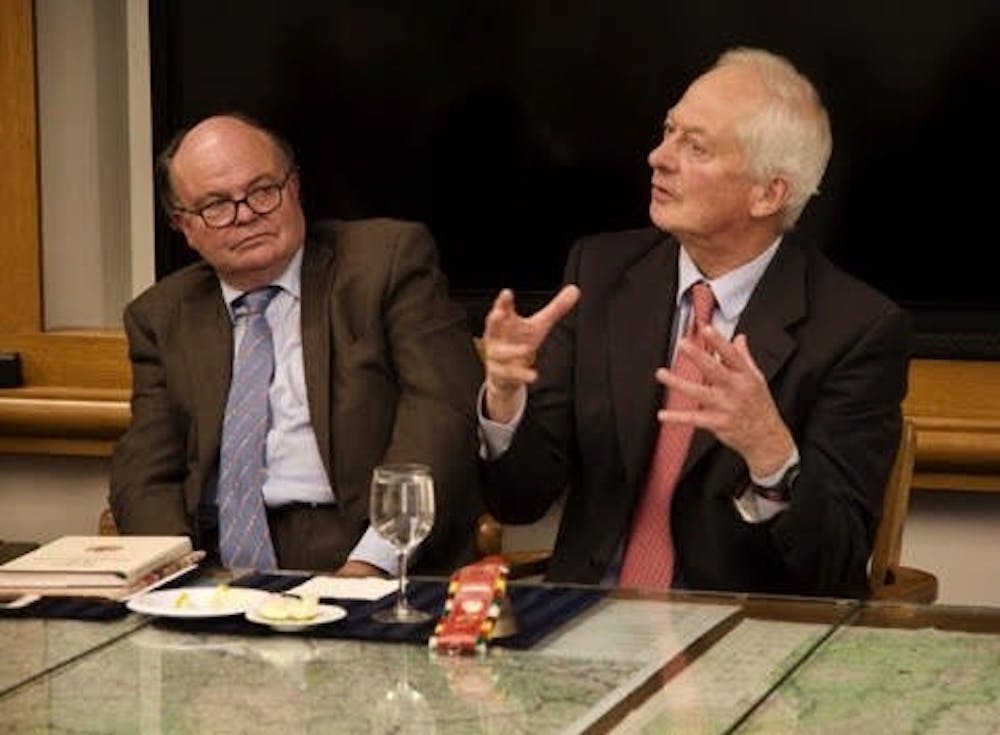A global expert on national sovereignty believes recent changes in U.S. diplomacy and trade won’t disrupt the foundations of the country’s democracy.
His Serene Highness Prince Hans-Adam II is famous for his writing on the roles of nation-states and his theories about democracy. As the reigning Prince of Liechtenstein, a 25-kilometer long country wedged between Switzerland and Austria, he knows a thing or two about defining a country.

Measuring in at approximately 25 kilometers long, the country of Liechtenstein is nestled between Switzerland and Austria. Photo courtesy of Wikimedia Commons.
In 2000, Highness founded the University’s Institute of Self-Determination, which is part of the Woodrow Wilson School.
He was on campus last month to participate in LISD events and lectures focusing on trade, European and U.S. diplomacy, Chinese foreign policy, and climate change.
On Oct. 18th, his highness spoke with The Daily Princetonian about how the world’s states are evolving.
The Daily Princetonian: What are your thoughts on the state of American democracy today?
His Highness Prince Hans Adams II of the Principality of Liechtenstein: American democracy has become somewhat more polarized over the last decade. One also sees this political polarization in Europe. The end of the Cold War brought economic and political changes. The election of President Trump is one symptom of those structural changes. The dominant political and economic position of the United States has become weaker, the Soviet Union has collapsed, and China is slowly becoming the dominant economic power in the world. As a European, one might not always agree with President Trump, but the United States will remain as the dominant democracy of the Western World for the foreseeable future.
DP: Many voices within the U.S. have expressed the belief that President Trump is in many ways undermining the principles of American democracy, do you agree with that?
HA: No, I do not think he could do that even if he had this intention, which I seriously doubt. History has shown that the American democracy is stronger than a president. A president can be removed from office if he no longer has the support of the American people and congress.

DP: How do you view the stances taken by President Trump on topics such as diplomacy and trade, especially with regards to NATO, EU, and the United Nations?
HA: With the end of the Cold War, it is not surprising that the United States is somewhat retreating from its international role, which I personally regret but can understand. We still need the U.S. to be active internationally.
DP: How do you think Brexit will influence the European continent, the U.K., and the European countries that are not members of the EU, such as Liechtenstein?
HA: Brexit will certainly weaken the European Union, but I do not think it will have much influence on the economic and political situation for those European countries that are not members of the European Union, such as Liechtenstein. How it will influence the position of the United Kingdom is still too early to say.

DP: How do you think the European Union will evolve over the next decade? Will it cease to exist any time soon?
HA: I believe the European Union will not change very much over the next decade. It will take a few years before a treaty between the European Union and the United Kingdom will have been agreed to and before one can judge how such a treaty will work out economically and politically. The European Union together with the member states of the European Economic Area, with Liechtenstein as one of its member states, is economically successful. Nevertheless, with the end of the Cold War, it is in my opinion, highly unlikely, that the European Union will become the United States of Europe, which was the original concept of the European Union after World War II.
DP: The refugee and migration crisis has been a topic of controversy in Western Europe over the past several years; how do you think Liechtenstein will be affected by the inflow of migrants from across the Mediterranean Sea?
HA: Liechtenstein has the advantage of being surrounded by the EU, so if refugees come, they first go into EU. We take a certain share of refugees as we always have. We actually have a high percentage in relative terms. It has been an advantage for us since many refugees have become quite successful. Western Europe also took in a large number of refugees, especially after World War II.








